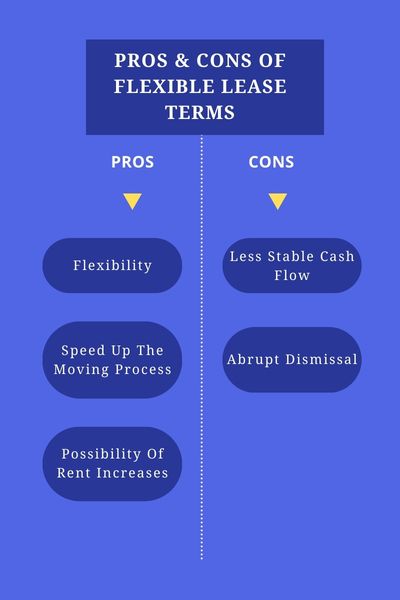
Tenants can rent a commercial or residential space on flexible lease terms, i.e. can be for a period of time shorter than a year. Month-to-month leases, leases that can be transferred from one flat to another, school year leases, summer leases and other seasonal leases are all examples of flexible leases. Landlord and renter will both have input towards the agreement’s duration in flexible lease terms agreement.
Tenants can usually sign a flexible lease agreement for a shorter period of time than a full year, such as six months, by this way also, landlords can make tenants happy. Leases that can be transferred from one flat to another are also considered flexible, as are school-year leases, summer leases and any other temporary lease arrangements.

Tenants who are indecisive about their long-term goals or who regularly change residences benefit greatly from these arrangements. In addition, by providing a more tailored experience, they can aid property managers in attracting and retaining tenants. However, the availability of adaptable lease terms varies by location and landlord. Next, we’ll look at the key distinctions between standard leases and more adaptable arrangements.
Pros of Flexible Lease Terms

1. Flexibility
Having the option to vacate the premises with minimal notice is a major perk of obtaining a flexible lease. A short-term lease is perfect if you don’t want to commit to a location for an extended period of time. You can terminate your lease without incurring any penalties if you determine the space isn’t suitable for your needs or if you are offered better employment elsewhere.
Leases with more wiggle room can be appealing to landlords who want to eventually sell or move into the property themselves.
2. Speed Up The Moving Process
The moving procedure can be completed more quickly since flexible rental agreements are simpler than long-term ones. Flexible Lease Terms can be helpful if you need a place to live or open a business urgently.
3. Possibility of Rent Increases
Whenever the conditions of a rental agreement are modified, rent increases become possible. Since landlords have the option to increase rent at each lease renewal, tenants should expect to pay more each time the lease is up for renewal. However, if you intend to increase the rent, it is crucial to provide adequate notice in flexible lease terms.
Cons of Flexible Lease Terms:
1. Less Stable Cash Flow
With conventional 12-month leases, you can count on a steady cash stream. Tenants may be present one month and gone the next if you have a month-to-month lease. Because of this, the likelihood that you will have tenants or vacancies in your rental properties increases with short-term leases. This disadvantage of flexible lease terms is not liked by tenants.
2. Abrupt Dismissal
Both the landlord and the tenant have the option to end the lease early under the terms of a flexible lease. Because of this unpredictability, future preparation is challenging. Both the tenant and the landlord would need to find a new place to stay immediately to avoid financial losses.
What To Do If Flexible Lease Terms are violated?

It is possible to have a renter who breaks the lease agreement even if the lease terms are short-term or flexible. Landlords have the right to evict tenants who have broken flexible lease terms. Here are some examples of the most frequent causes of eviction:
- Process-of-eviction
- Lack of Rent Payment or Late Payment
- Significant Property Loss
- Violation of Lease Terms
There is a certain procedure to follow in order to evict a tenant for breaking the lease or failing to pay rent. Without any preparation or warning, you may find yourself embroiled in an unnecessary legal struggle. So, here’s what you need to do to get rid of a tenant who has broken the agreement.
The Eviction Procedure
First, depending on the laws in your area, you must give your tenant a few days earlier like- 30-, 60-, or 90-day notice to quit the property. Always give your tenant written notice and maintain a copy for your records.
You should apply for eviction if your renter ignores your notice and continues to refuse to pay rent or vacate the premises. If a landlord wants to evict a tenant, he or she must go through the legal system and provide notice to the renter.
Tenants have a right to respond to the complaint and present their side of the story in court, so be patient and wait for their response.
Landlords and tenants both need to appear at the court hearing on the appointed date and present their evidence. The judge can then issue a ruling after hearing arguments from both parties.
When a judge orders a tenant to leave a property, that person has only a certain amount of time to pack up and go. If the landlord still refuses to comply with the court’s order, a Warrant of Restitution may be issued and the tenant evicted.
Property Management Is the Key to Rent Collection
Making sure you and your tenants are on the same page is essential whether you provide month-to-month or fixed-term leases. Any confusion about the flexible lease terms can be avoided with consistent communication between the landlord and renter.
If you are having problems keeping track of your rental properties and renters, it may be time to consider hiring professional rental management services. Triumph Property Management Company has the experienced managers you need to take care of your tenants and property. If you need assistance with tenant acquisition, tenant screening, lease creation, property upkeep, etc., we’ve got you covered there, too.